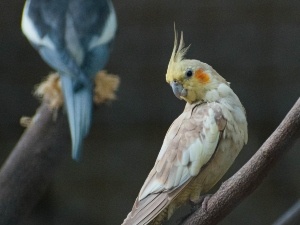
Birds are curious animals who will fly up and down and explore if they are allowed to. Unfortunately, this can sometimes get birds into trouble and cause them to suffer injuries like hitting their head.
This article is a look into what you can do if your cockatiel hits its head
Table of Contents
Cockatiel hit head:
Cockatiels are quite fragile animals and small injuries to us can mean big injuries to them, and these small animals can injure themselves quite easily.
Head injuries can happen if they fly into something like a window mirror or a ceiling fan, or, the birds can also develop injuries if they fight with other birds.
If your bird suffers an injury to its head then the bird can develop a concussion. If your bird hits its head then it may sustain a fracture, a concussion, or, a laceration on its head.
Signs of a concussion:
Signs of a concussion in birds that you should look out for include:
- Wing drop
- Unresponsive
- Unable to perch
- Severe shock
- Aloofness
- Loss of appetite
- Uncoordinated flight
- Needing to sleep more
What to do:
You would need to stabilize the bird at home and then take the bird to the vet as soon as it is stable.
Treating the bird at home:
Taking your bird to the vet is the recommended course of action in this case. Birds can die after striking their heads so it’s very important the that your bird be seen by a vet as soon as possible
Note: Do not rush the bird to the vet if it is still in shock, in pain or if the bird is concussed. Only take the bird to the vet once the bird is stabilized.
If the bird is not stabilized before the trip then the bird may not survive the trip.
You can stabilize the bird by talking sweetly to the bird, this will help it calm down.
You’ll know that the bird is stabilized when its breathing is more even, it is aware of its surroundings, and, it is responsive to you
If the bird is bleeding on its head then you can help stop the bleeding by applying some styptic powder, cornstarch, or flour to the wound to stop the bleeding.
Make sure to keep the beak away from the powder as the bird may inhale it.
If you can’t immediately get the bird to the vet then keeping it warm, isolated, and calm until you can get the bird to the vet is recommended.
The bird is likely in a lot of shock and doesn’t need anything fussing it at this point. Keep the bird warm by wrapping it in a towel that has been left in the drier for a minute.
Taking the bird to the vet:
Taking your bird to the vet within 8 to 12 hours of it being injured is recommended.
Put the bird in a container like a pet carrier or a box while traveling to the vet and cover the container with a towel or blanket if your bird usually gets frightened by new environments.
Also, avoid driving roughly while traveling as this can stress the bird.
The vet will examine the bird and give the bird medicines that will help reduce any swelling on the brain
If you enjoyed this article then you may also be interested in other bird related articles. Here are some articles that you may be interested in: Why Are My Conures Feathers Turning Black, Feather Bronzing Vs Stress Bars, Budgie Flying Back And Forth In Cage, My Budgie Won’t Come Out Of His Cage Anymore, How To Get A Bird Down From A High Place, How To Train A Cockatiel Not To Fly Away

